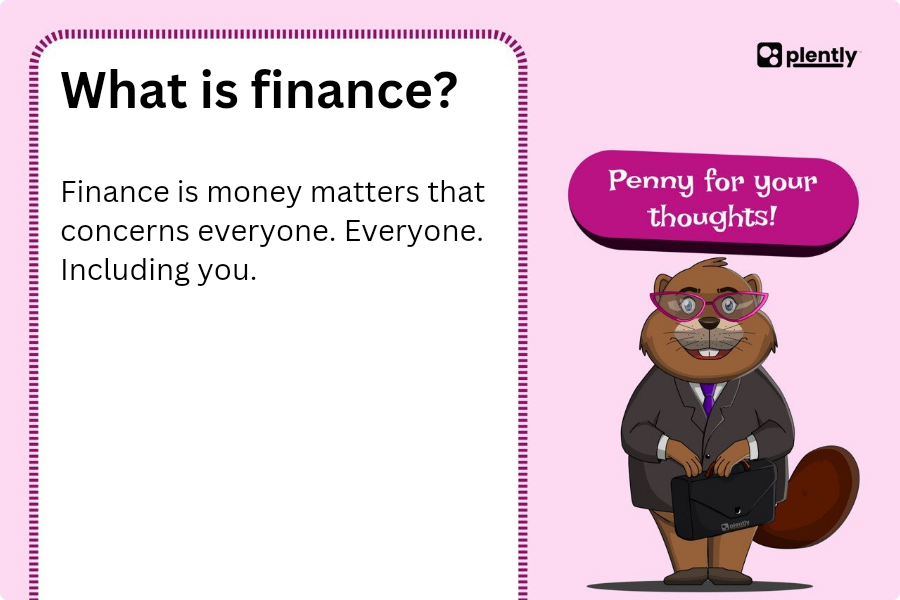Finance For Beginners
7 mins read
Published on Aug 1, 2024

Header image by Tima Miroshnichenko from Pexels.
Introduction
Ah, Finance, a pretty popular term within and outside its circle of expertise. The general understanding of the word is “all things money”, which basically makes it serious business – pun unintended - for people with lots of money, yes? Well, not really.
Before we find out who finance is for and about, let’s take a look at what finance means.
Meaning and definitions of finance
From the Oxford dictionary on google, you’ll see that finance can be used as a noun or a verb. As a verb, it is defined as an act of funding (by/for a person or enterprise). To finance is any act in the management of large amounts of money, especially by governments or large companies.

Other definitions
Finance is defined as the management of money and includes activities such as investing, borrowing, lending, budgeting, saving, and forecasting. — Corporate Finance Institute
Finance is a term for matters regarding the management, creation, and study of money and investments. — Investopedia
Finance, the process of raising funds or capital for any kind of expenditure. — Britannica
Finance is the study and discipline of money, currency and capital assets. Wikipedia
Pennypedia – if you will hehe – can therefore surmise finance as money matters concerning everyone. Everyone. You too.
History of finance
Let’s face it, we all want stuff. We always have. While humans didn't start using money – in the sense we know it now – until at least the 7th century, pretty much everyone agrees different aspects of finance (lending and interest, savings, exchange for example) have been around since the dawn of civilization.
In the wake of technological advancement as we have it now, even the oldest, most simple areas of finance have taken on new forms while maintaining their original purpose.

Photo by yasart.jpg from Pexels.
Money and trade
The use of coins as a means of representing money began in the years between 600 and 570 BCE. The oldest known acts of minting coins are credited to cities of the ancient Greek empire: Aegina, Athens, and Corinth. By 640 BC, Lydia, known as the first place where permanent retail shops opened, had started to use coin money, according to the historian Herodotus.
By 1200 BC, cowrie shells were used as a form of money in Africa and Asia.
Saving and interest
Dating back to around 3000BC is the earliest historical evidence of modern day banking and financial systems. Temples and palaces of the Babylonian empire were used for the storage of valuables. (Talk about a safe space.)
The Code of Hammurabi (1792–1750 BC) included laws governing banking operations.
Stock exchange and further financing
The first known instance of stock exchange happened in Belgium in 1531 AD. Two centuries later, the popular London Stock Exchange and New York Stock Exchange popped up.
Finance, as a study of theory and practice distinct from the field of economics, arose in the 1940s and 1950s with the works of Harry Markowitz, William F. Sharpe, Fischer Black, and Myron Scholes, to name just a few.

Photo by nappy from Pexels.
Types of finance
Finance can be broadly divided into three categories:
Public finance: tax, spending, budgeting, and debt issuance policies that affect how a government pays for the services it provides to the public.
Corporate finance: financial activities related to running a company or business, usually with a division or department set up to oversee those financial activities.
Personal finance: money matters for individuals and their families, including budgeting, strategizing, saving and investing, purchasing financial products, and safeguarding assets. Banking is also considered a component of personal finance.
Other types of finance like social finance behavioural finance exists as areas of specialisation for those in the field.
We decided to give you a minute to take in this introductory knowledge. In a later article, we tackle the concept of financial literacy and why it matters to anyone remotely interested in finance. Stay tuned!
Last updated: Oct 8, 2024
Share this with your friends and family
Join the money party
Level up your financial game with our exclusive blog updates, delivered straight to your inbox
Other articles you might enjoy

Aug 2, 2025
How To Protect Your Finances From Identity Theft and Synthetic Fraud

Jul 25, 2025
Money Traps to Avoid in Your 20s (That No One Warns You About)

Jul 17, 2025
How to Financially Prep for a Layoff (Before It Happens)

Jun 26, 2025
2025 Tax Guide for Freelancers: How to Handle 1099 Income, Self-Employment, & More
Join the #1 banking app for the Commonwealth
Get started on Plently
Rosemary D.
Phia Consultants
It's like having the best financial partner in my pocket!

Jonathan G.
Open Space Inc
Plently has truly transformed my financial life.

Emily H.
Student
With their user-friendly interface and innovative tools, managing my money has become a breeze.

Margaret D.
Small Business Owner
I finally feel in control of my finances, thanks to Plently!

Alexander P.
Small Business Owner
After Plently, I can't imagine going back to traditional banking!

Oliver A.
Student
Being a part of a Money Circle has been a game-changer for me. It's not just about financial contributions; it's a supportive community working together towards shared goals

Loading comments...